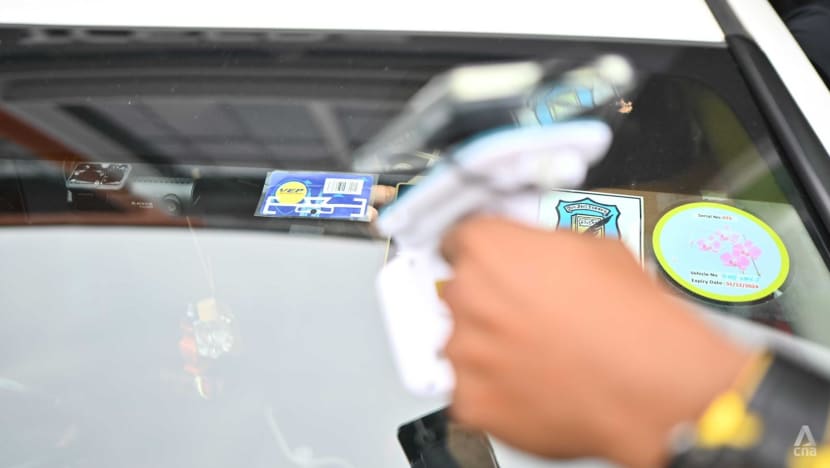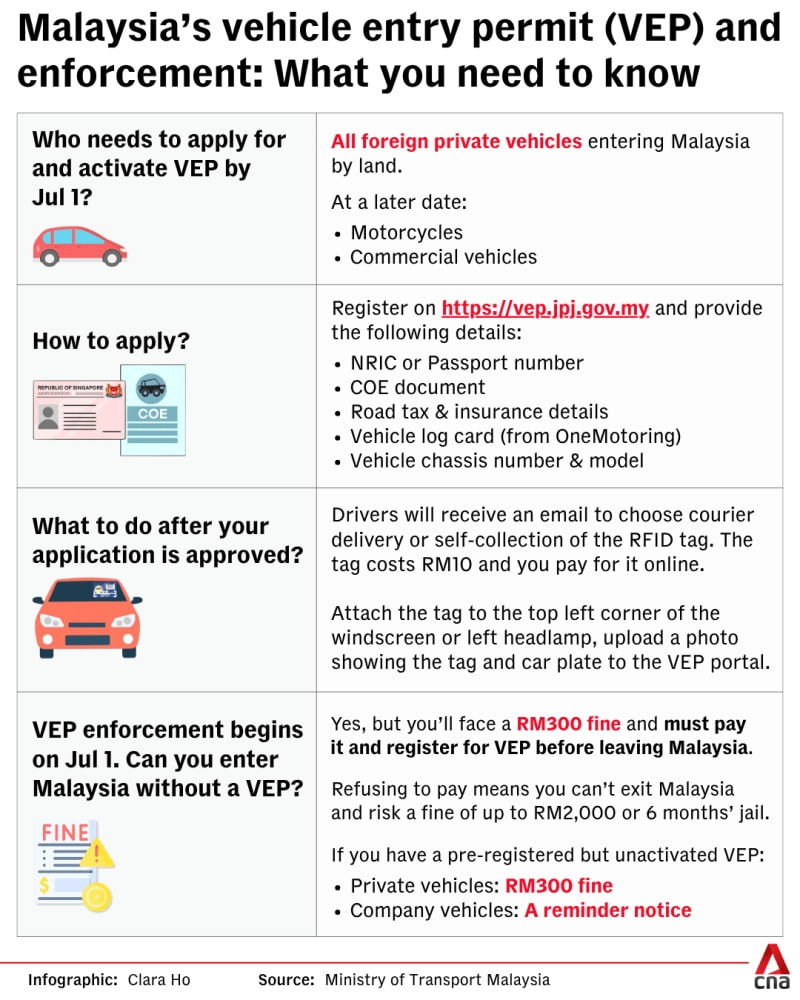CNA Explains: How will Malaysia’s VEP enforcement work, and how do motorists steer clear of troubleee?
The enforcement starting Jul 1 will mark the end of the ongoing grace period where motorists who have yet to apply for the Vehicle Entry Permit (VEP) are given warning notices.

A TCSens staff installing a VEP tag on a Singapore-registered vehicle at the VEP centre in Danga Bay on Jun 4, 2025. TCSens is a vendor hired by Malaysia's Road Transport Department to assist drivers with the installation of tags and also to handle in-person enquiries on VEPs in Johor Bahru. (Photo: CNA/Zamzahuri Abas)

This audio is generated by an AI tool.
SINGAPORE: Singapore-registered vehicles entering Malaysia without a valid Vehicle Entry Permit (VEP) will soon face a compound fine of RM300 (US$70.65) at its land border checkpoints, the country’s Transport Ministry announced on Wednesday (Jun 4).
The ramped-up enforcement will take place nine months after Malaysia began requiring all foreign-registered vehicles entering the country by land from Singapore to use VEPs from Oct 1 last year.
Here’s what you need to know about the VEP enforcement measures and penalties, and what motorists should do to avoid them:
How will Malaysia carry out VEP enforcement after Jul 1?
Owners of all foreign private vehicles are required to register for a VEP before entering Malaysia.
This rule does not apply to motorcycles as well as government and embassy vehicles for now.
But Malaysia plans to make the VEP requirement mandatory for motorcycles in the future, Malay Mail reported.
Drivers found without a valid VEP at Malaysia’s land borders with Singapore may face a compound fine of RM300 (US$70.65), Malaysia’s Transport Ministry said on Wednesday.
The summons will be issued to those who have not registered or activated the VEP.
And the drivers must pay the fine and apply for the permit before leaving Malaysia, its Transport Minister Anthony Loke said.

Vehicles with pre-registered but unactivated VEPs will also be issued the summons, and payment must similarly be made before exiting Malaysia.
Fines must be paid via cashless methods at Road Transport Department (JPJ) counters, JPJ mobile counters or online via the MyEG website.
The same penalties apply to private company vehicles without a valid VEP, but such vehicles with pre-registered but unactivated VEPs will be issued a reminder notice instead and be allowed to exit Malaysia.
This is because drivers of such vehicles have experienced issues with registering the VEP e-wallet under a company name, Loke said.

“In terms of enforcement, it will be done outside the border (checkpoint),” Loke said, adding that this is to prevent congestion there.
Checks will instead be done through enforcement team operations at “various locations” within Johor Bahru, he added, without elaborating where these would be.
“So it will not be individual officers going after the motorists.”
While enforcement would not be done “24 hours”, he stressed that authorities would automatically know which vehicles do not have VEP.
Still, Loke had this to say: “Let me assure all Singapore vehicle owners, they can still come in even if they do not have a VEP.”
CNA has reached out to JPJ for more details on the enforcement measures.
The enforcement will mark the end of the ongoing grace period where motorists who have yet to apply for the VEP are given warning notices.
Malaysia had announced last May that all foreign-registered vehicles entering the country by land from Singapore would be required to use VEPs from October 2024.
Will errant motorists’ cars be towed away if they do not pay the fine?
Loke gave the assurance that Malaysia will not resort to towing away vehicles if drivers refuse to pay the fine imposed, citing the country’s “very close relationship” with Singapore.
“We are not going towards that, don’t frighten tourists … We welcome Singaporean tourists to come to Malaysia, especially Johor Bahru,” he said on Wednesday.
Is there a stiffer penalty for repeat offenders?
When asked whether repeat offenders would face a heavier penalty, Loke responded that there is “no such thing” as a second offence.
He explained that the offence of flouting the VEP rule is compoundable with a fine of RM300. The errant driver will immediately be required to register for a VEP before being allowed to leave Malaysia, so the issue of a repeat offence does not arise.
“If they do not want to pay the compound, they want to challenge it, then they can go to court but the court can give them a fine of up to RM2,000 and six months jail because it is part of the law,” he said.
Before Wednesday's announcement of the fine, the Malaysia government had similarly said last year that motorists who fail to install a VEP may be fined up to RM2,000 or jailed for up to six months.













